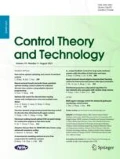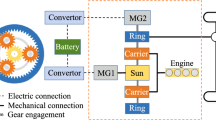Abstract
This paper presents a real-time energy optimization algorithm for a hybrid electric vehicle (HEV) that operates with adaptive cruise control (ACC). Real-time energy optimization is an essential issue such that the HEV powertrain system is as efficient as possible. With connected vehicle technique, ACC system shows considerable potential of high energy efficiency. Combining a classical ACC algorithm, a two-level cooperative control scheme is constructed to realize real-time power distribution for the host HEV that operates in a vehicle platoon. The proposed control strategy actually provides a solution for an optimal control problem with multi objectives in terms of string stable of vehicle platoon and energy consumption minimization of the individual following vehicle. The string stability and the real-time optimization performance of the cooperative control system are confirmed by simulations with respect to several operating scenarios.
Similar content being viewed by others
References
A. R. Salisa, N. Zhang, J. G. Zhu. A comparative analysis of fuel economy and emissions between a conventional HEV and the UTS PHEV. IEEE Transactions on Vehicular Technology, 2010, 60(1): 44–54.
E. Paikari, S. Tahmasseby, B. Far. A simulation-based benefit analysis of deploying connected vehicles using dedicated short range communication. Proceedings of the IEEE Intelligent Vehicles Symposium, Dearborn: IEEE, 2014: 980–985.
J. Guanetti, Y. Kim, F. Borrelli. Control of connected and automated vehicles: State of the art and future challenges. Annual Reviews in Control, 2018, 45: 18–40.
F. Zhang, X. Hu, R. Langari, et al. Energy management strategies of connected HEVs and PHEVs: recent progress and outlook. Progress in Energy and Combustion Science, 2019, 73: 235–256.
C. M. Martinez, X. Hu, D. Cao, et al. Energy management in plug-in hybrid electric vehicles: recent progress and a connected vehicles perspective. IEEE Transactions on Vehicular Technology, 2016, 66(6): 4534–4549.
S. E. Li, Y. Zheng, K. Li, et al. Dynamical modeling and distributed control of connected and automated vehicles: Challenges and opportunities. IEEE Intelligent Transportation Systems Magazine, 2017, 9(3): 46–58.
D. Swaroop, J. Hedrick, C. Chien, et al. A comparision of spacing and headway control laws for automatically controlled vehicles. Vehicle System Dynamics, 1994, 23(1): 597–625.
S. Feng, Y. Zhang, S. E. Li, et al. String stabilityforvehicular platoon control: definitions and analysis methods. Annual Reviews in Control, 2019, 47: 81–97.
J. Ploeg, D. P. Shukla, N. van de Wouw, et al. Controller synthesis for string stability of vehicle platoons. IEEE Transactions on Intelligent Transportation Systems, 2013, 15(2): 854–865.
L. Xiao, F. Gao. Practical string stability of platoon of adaptive cruise control vehicles. IEEE Transactions on Intelligent Transportation Systems, 2011, 12(4): 1184–1194.
D. Lang, R. Schmied, L. Del Re. Prediction of preceding driver behavior for fuel efficient cooperative adaptive cruise control. SAE International Journal of Engines, 2014, 7(1): 14–20.
B. Asadi, A. Vahidi. Predictive cruise control: utilizing upcoming traffic signal information for improving fuel economy and reducing trip time. IEEE Transactions on Control Systems Technology, 2010, 19(3): 707–714.
D. He, Y. Shi, H. Li, et al. Multiobjective predictive cruise control for connected vehicle systems on urban conditions with InPA-SQP. Optimal Control Applications and Methods, 2019, 40(3): 479–498.
F. Ma, Y. Yang, J. Wang, et al. Predictive energy-saving optimization based on nonlinear model predictive control for cooperative connected vehicles platoon with V2V communication. Energy, 2019, 189: https://doi.org/10.1016/j.energy.2019.116120.
D. He, B. Peng. Gaussian learning-based fuzzy predictive cruise control for improving safety and economy of connected vehicles. IET Intelligent Transport Systems, 2020, 14(5): 346–355.
S. Li, K. Li, R. Rajamani, et al. Model predictive multi-objective vehicular adaptive cruise control. IEEE Transactions on Control Systems Technology, 2010, 19(3): 556–566.
Q. Jiang, F. Ossart, C. Marchand. Comparative study of realtime HEV eneergy management strategies. IEEE Transactions on Vehicular Technology, 2017, 66(12): 10875–10888.
J. Zhang, T. Shen. Real-time fuel economy optimization with nonlinear MPC for PHEVs. IEEE Transactions on Control Systems Technology, 2016, 24(6): 2167–2175.
S. Uebel, N. Murgovski, C. Tempelhahn, et al. Optimal energy management and velocity control of hybrid electric vehicles. IEEE Transactions on Vehicular Technology, 2018, 67(1): 327–337.
J. Zhang, T. Shen, J. Kako. Short-term optimal energy management of power-split hybrid electric vehicles under velocity tracking control. IEEE Transactions on Vehicular Technology, 2020, 69(1): 182–193.
B. Zhang, W. Cao, T. Shen. Two-stage on-board optimization of merging velocity planning with energy management for HEVs. Control Theory and Technology, 2019, 17(4): 335–345.
L. Guo, H. Chen, B. Gao, et al. Energy management of HEVs based on velocity profile optimization. Science China Information Sciences, 2019, 62 (8): https://doi.org/10.1007/s11432-018-9529-7.
J. Zhang, F. Xu, Y. Zhang, et al. ELM-based driver torque demand prediction and real-time optimal energy management strategy for HEVs. Neural Computing and Applications, 2019: DOI https://doi.org/10.1007/s00521-019-04240-7.
G. Li, D. Gorges. Ecological adaptive cruise control and energy management strategy for hybrid electric vehicles based on heuristic dynamic programming. IEEE Transactions on Intelligent Transportation Systems, 2019, 20(9): 3526–3535.
H. Liu, C. Miao, G. G. Zhu. Economic adaptive cruise control for a power split hybrid electric vehicle. IEEE Transactions on Intelligent Transportation Systems, 2019: DOI https://doi.org/10.1109/TITS.2019.2938923.
S. Tajeddin, M. Vajedi, N. L. Azad. A Newton/GMRES approach to predictive ecological adaptive cruise control of a plug-in hybrid electric vehicle in car-following scenarios. IFAC-PapersOnLine, 2016, 49(21): 59–65.
Acknowledgements
The authors would like to thank Dr. Junichi Kako of Toyota Motor Corporation for providing the HEV powertrain system data that was used in the control design and simulation tests and valuable discussions on this work.
Author information
Authors and Affiliations
Corresponding author
Additional information
This work was supported by the National Natural Science Foundation (NNSF) of China (No. 61973053).
Jiangyan ZHANG received the B.E. and M.E. degrees in Electrical Engineering from Yanshan University, Qinhuangdao, China, in 2005 and 2008, respectively, and the Ph.D. degree in Mechanical Engineering from Sophia University, Tokyo, Japan, in 2011. She is currently an Associate professor with the College of Mechanical and Electronic Engineering of Dalian Minzu University at Dalian, China. Her research interests are mainly in control theory and applications of control to the automotive powertrain systems.
Fuguo XU received the M.E. degree in Control Engineering from Yanshan University, Qinhuangdao, China, in 2016, and the Ph.D. degree in Mechanical Engineering from Sophia University, Tokyo, Japan, in 2019. Since April 2019, he has been a postdoctoral fellow with the Department of Engineering and Applied Sciences, Sophia University. His research interests include optimal control and applications in powertrain system of hybrid electric vehicles.
Rights and permissions
About this article
Cite this article
Zhang, J., Xu, F. Real-time optimization of energy consumption under adaptive cruise control for connected HEVs. Control Theory Technol. 18, 182–192 (2020). https://doi.org/10.1007/s11768-020-0020-7
Received:
Revised:
Accepted:
Published:
Issue Date:
DOI: https://doi.org/10.1007/s11768-020-0020-7




